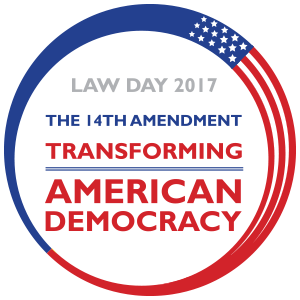[vc_row][vc_column width=”5/6″][vc_column_text] Every year since 1958, the United States has proclaimed May 1 Law Day, an annual opportunity to reflect on the importance of the rule of law in our daily lives. This year, as we close in on the 150th anniversary of the ratification of the 14th Amendment, the American Bar Association has chosen as the Law Day theme, “The Fourteenth Amendment: Transforming American Democracy.” (For more information on Law Day, please visit www.lawday.org).
Every year since 1958, the United States has proclaimed May 1 Law Day, an annual opportunity to reflect on the importance of the rule of law in our daily lives. This year, as we close in on the 150th anniversary of the ratification of the 14th Amendment, the American Bar Association has chosen as the Law Day theme, “The Fourteenth Amendment: Transforming American Democracy.” (For more information on Law Day, please visit www.lawday.org).
At the birth of our nation, our Founders proclaimed to the world, “We hold these truths to be self-evident, that all men are created equal, that they are endowed by their Creator with certain unalienable Rights, that among these are Life, Liberty and the pursuit of Happiness.” Ninety years later, our American democracy had reached a critical point in its struggle to fulfill its own promises.
Nationwide abolition of slavery came with the ratification of the 13th Amendment in 1865, but several of the former Confederate states still restricted the fundamental rights of the newly freed slaves through the passage of so-called “Black Codes.” Congress sought to combat these abuses through the enactment, over President Andrew Johnson’s veto, of the Civil Rights Act of 1866, defining citizenship as a right of all persons born in the United States (in contrast to the infamous holding of the Dred Scott decision) and affirming the equal protection of all citizens under law. However, two big issues led many in Congress to advocate for its salient features to be adopted as a constitutional amendment: doubts over Congress’s constitutional power to prevent state and local governments from infringing on their citizens’ civil rights, and concerns that a reverse in electoral fortunes between the then-dominant Republicans and Southern Democrats could lead to the 1866 Act’s repeal.
The road from the 1866 Act to the 14th Amendment hardly followed a straight path. Over 70 proposals were drafted; two proposals were introduced but failed in Congress before a third finally passed in June 1866. Ratification in the states was fiercely debated. Every former Confederate state except for Tennessee refused to ratify it and had to be coerced to reverse themselves by legislation declaring that they would not be readmitted to the Union until they had ratified it. Ohio, New Jersey, and Oregon ratified the 14th Amendment and then rescinded their ratifications in 1868. It was not until July 9, 1868, nearly two years after it was sent to the states for ratification, that the 14th Amendment became a part of the U.S. Constitution.
The first section of the 14th Amendment is among the most frequently invoked constitutional provisions in the federal courts: “All persons born or naturalized in the United States, and subject to the jurisdiction thereof, are citizens of the United States and of the State wherein they reside. No State shall make or enforce any law which shall abridge the privileges or immunities of citizens of the United states; nor shall any State deprive any person of life, liberty, or property, without due process of law; nor deny to any person within its jurisdiction the equal protection of the laws.” In nearly 150 years since its adoption, these 80 words have formed a bulwark for equal rights and the foundation of a variety of individual liberties in the United States. The Supreme Court has used this provision to prohibit state and local laws and government officials from infringing on most of the rights enshrined in the original Bill of Rights, leading to the requirement for arrested criminal suspects to receive the Miranda warning that is so well-known as to be commonly heard in our depictions of police work in popular culture; a variety of decisions protecting Americans from unlawful search and seizure by state and local police; the decision in Gideon v. Wainwright (immortalized in the film “Gideon’s Trumpet”) guaranteeing the right to counsel for indigent defendants in all criminal cases; and the Court’s defense of freedom of speech and freedom of the press in New York Times v. Sullivan, among many others. The Equal Protection Clause was no less profound, forming the basis for the landmark Brown v. Board of Education decision that outlawed racial segregation in public education, the Loving v. Virginia decision overturning state laws that prohibited interracial marriage, as well as many other Supreme Court decisions protecting equal rights.
In the early 1960s, Justice John Marshall Harlan II argued, then in dissenting opinions, that the 14th Amendment’s Due Process Clause protects more than just the rights guaranteed expressly by the Bill of Rights, and “includes a freedom from all substantial arbitrary impositions and purposeless restraints”—a view that, not long after, began to be adopted by the majority of the Court. The substantive due process cases that followed broke new ground, not without controversy at times, with a line of cases including such well-known names as Griswold v. Connecticut (overturning a Connecticut law that prohibited birth control), Roe v. Wade, and Obergefell v. Hodges (ruling that same-sex couples enjoy a nationwide fundamental right to marriage). Still today, these substantive due process cases stand at the frontier of constitutional law and underlie the hotly contested nomination process for Supreme Court justices that seems to have become the norm over the past 30 years.
Nearly every generation in the last century has believed, for one reason or another, that Americans are more divided than ever before, our political processes more partisan and contentious than they have ever been. As we reflect this Law Day on the history of the 14th Amendment and its role at the vanguard of our evolving American democracy, however, we see that vigorous debate, division, and controversy have always gone hand-in-hand with our ongoing struggle to make our republic fulfill the promises of 1776—to defend the rights of “Life, Liberty, and the pursuit of Happiness” for all. The 14th Amendment, no doubt, will continue to play a pivotal role in those efforts, as it has for the past century and a half.[/vc_column_text][/vc_column][vc_column width=”1/6″][/vc_column][/vc_row]





